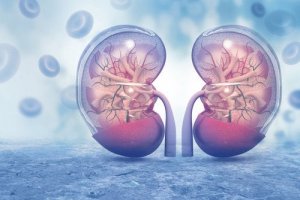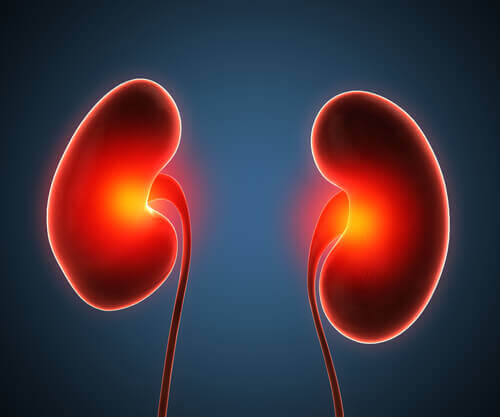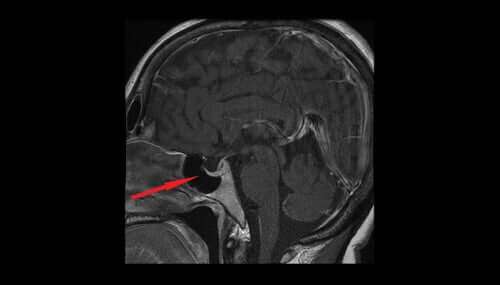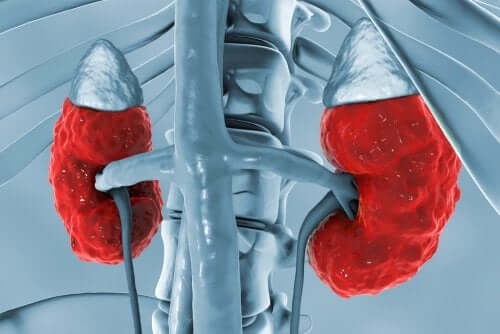The Characteristics and Effects of Vasopressin

Vasopressin, also known as antidiuretic hormone or ADH, comes out of the hypothalamus’s magnocellular nuclei. From there it passes to the neurohypophysis and then finally into the blood system. It helps regulate the amount of water in the body by controlling the amount of water the kidneys excrete. In this article we’ll be looking at the different characteristics and effects of vasopressin.
It’s an oligopeptide formed by the union of 9 amino acids. The amino acids that make up this hormone are cysteine, tyrosine, glutamine, proline, an amino group, phenylalanine, arginine, asparagine, and a carboxyl group.
The function of vasopressin

Even though its main function is to regulate the activity of the kidneys, it also has some influence on the cardiovascular system and the central nervous system, among others.
This hormone comes out in response to the hypertonicity of body fluids. This helps the kidneys reabsorb water and return it to the blood from the tubules of the nephron, normalizing the tonicity of the body fluids.
As a consequence of the renal reabsorption of water, the urine becomes more concentrated and thus it decreases in volume. So, when vasopressin comes out in high concentrations, it can increase blood pressure as it induces moderate vasoconstriction.
The effects of vasopressin
On the kidneys
Its action on the kidneys refines a series of processes that concentrate the urine. By promoting such concentration, vasopressin produces the net reabsorption of free water to the extracellular fluid.
Vasopressin acts on the kidneys giving rise to three main effects:
- It increases the water permeability of initial and cortical collecting tubules. In addition, it increases that of the external and internal medullary canal in the kidney. So, the water reabsorbs and there’s an excretion of more concentrated urine.
- Also, it increases the permeability of the internal medullary portion of the collecting duct to the uric acid.
- Finally, there’s increased sodium absorption through the ascending limb of loop of Henle.
Discover: What is the Hormone Oxytocin?
Central nervous system
The antidiuretic hormone released from hypothalamic neurons has to do with the regulation of blood pressure and temperature. There’s evidence that this hormone may have analgesic effects, which depend on sex and stress.
Vascular effects
Vasopressin is a potent vasoconstrictor and can profoundly increase systemic vascular resistance, which explains the hormone’s original name “arginine vasopressin.”
How does ADH regulate itself?

Generally, vasopressin release is controlled by the osmolarity of extracellular fluids. The decrease in osmolarity reduces ADH secretion, while an increase in osmolarity ups ADH secretion.
Receptors in the heart and large blood vessels detect low blood pressure or a decrease in blood volume. This occurs when there’s bleeding, or during dehydration. So, under these circumstances, they stimulate the release of vasopressin.
Antidiuretic hormone secretion also occurs if the concentration of salts in the bloodstream goes up. Similarly, if the concentration of salts reaches abnormally low levels then a person would face hyponatremia.
The antidiuretic hormone also releases by thirst, nausea, vomiting, and pain. Thus, it acts to maintain the volume of fluid in the bloodstream during times of stress or when there are injuries.
What happens if there’s excess vasopressin?
High levels of this kind of hormone promote water retention in the body by the kidneys. There’s a condition called syndrome of inappropriate antidiuretic hormone secretion.
In patients suffering from this syndrome, an excess of vasopressin releases when they don’t need it. So, it results in excessive water retention that dilutes the blood, giving a characteristically low salt concentration.
Excessive levels of this antidiuretic hormone can happen due to the side effects of medications, and lung, chest wall, hypothalamus, and pituitary gland diseases.
You may also be interested: What’s a Pituitary Adenoma?
What if there’s almost no vasopressin?

Low levels of the antidiuretic hormone will make the kidneys excrete excess water. The volume of urine will increase and will lead to dehydration and a decrease in blood pressure. So, low levels of antidiuretic hormone may indicate damage to the hypothalamus or pituitary gland or primary polydipsia.
Conclusion
Vasopressin is positioning itself as an excellent therapeutic alternative alone or in combination with other vasopressors in the daily practice of intensive medicine.
All cited sources were thoroughly reviewed by our team to ensure their quality, reliability, currency, and validity. The bibliography of this article was considered reliable and of academic or scientific accuracy.
-
Teres, J. (1983). VASOPRESINA. Gastroenterologia y Hepatologia.
-
Carrillo, R., Carvajal, R., & Hernandez, C. (2003). Vasopresina: una nueva alternativa terapéutica en el enfermo grave. Revista de La Asociacion Mexicana de Medicina Critica y Terapia Intensiva.
-
González Chon, O., & García López, S. M. del C. (2002). Vasopresina: Usos en la práctica cardiovascular. Archivos de Cardiologia de Mexico.
This text is provided for informational purposes only and does not replace consultation with a professional. If in doubt, consult your specialist.








